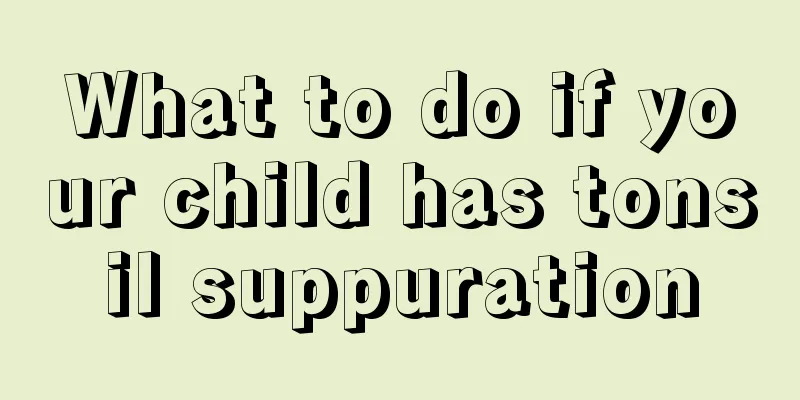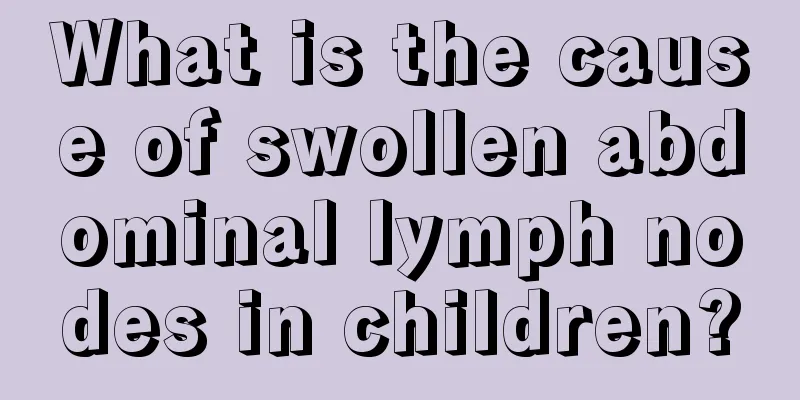What to do if your child has tonsil suppuration

|
Children have relatively low resistance and immunity, and are particularly susceptible to various diseases. Most children will have inflamed and suppurated tonsils after catching a cold. When a child shows this symptom, the mother must remain calm. Although inflamed and suppurated tonsils are directly related to colds, they are not entirely caused by colds. They are also related to many other inflammations. What I want to introduce to you is some basic knowledge about tonsillitis in young children. 1. Causes Purulent tonsillitis in children has an acute onset, with high fever, obvious sore throat, enlarged adenoids and tonsils, especially when swallowing, which may cause the child to refuse to eat. Examination may show congestion in the pharynx, yellow-white pus spots or pus coating on the swollen tonsils, and enlarged lymph nodes in the neck. The main treatment principle for acute suppurative tonsillitis is anti-infection. You can take antibacterial lozenges sublingually, and at the same time pay attention to rest, drink plenty of water, and eat liquid food. Due to infection by bacteria and viruses, bacteria are more common. The pathogens are mostly hemolytic streptococci, staphylococci, and pneumococci. These bacteria usually exist in the human throat and tonsil crypts. Under normal circumstances, due to the integrity of the tonsil surface epithelium and the continuous secretion of mucous glands, the bacteria can be discharged from the crypt opening along with the shed epithelial bacteria, thus maintaining the health of the body. When the body's resistance is reduced due to excessive fatigue, cold, or local effects of physical or chemical factors, the blood supply to the tonsils is reduced, the glandular secretion function is reduced, and the epithelial defense ability is reduced. Bacteria take advantage of the situation, multiply, and cause tonsillitis. 2. Symptoms Repeated attacks of acute tonsillitis may develop into chronic tonsillitis, the cause of which is related to the low immunity of children. Chronic tonsillitis Pathogenic bacteria are stored in the tonsils. The toxins secreted by the bacteria not only enter the blood and inflammatory secretions and are swallowed to irritate the gastrointestinal tract, but can also cause long-term low fever, indigestion, loss of appetite in children, and even affect growth and development. When the body's immunity decreases, it can have an acute attack. At the same time, bacteria and toxins can cause allergic reactions in the body, causing rheumatic fever (rheumatic arthritis and rheumatic heart disease), nephritis and other diseases. 3. Hazards Acute tonsillitis usually causes great pain and suffering to patients and damages their health. If acute tonsillitis is not treated promptly or incompletely, it can easily turn into chronic tonsillitis. Although chronic tonsillitis is not as serious as acute inflammation, it can have long-term effects on the patient's work and life. Under the stimulation of long-term inflammation, the tonsils may lose their normal function and turn into "lesions" that are harmful to the human body, which may cause various complications such as otitis media, sinusitis, glomerulonephritis, myocarditis, rheumatic heart disease, rheumatoid arthritis, etc. 4. Prevention Pay attention to keeping your child at a suitable temperature. It is best not to wear too many clothes. Wearing too many clothes will cause excessive sweating, which will make it easier for your child to catch a cold. After children sweat during activities, they should take off their wet clothes in time. After sweating, the pores will expand, and cold air will enter the body more easily. Children's illness must be cured at one time, otherwise high fever can easily cause infection, causing the child to suffer from pediatric purulent tonsillitis. Eat a balanced diet and improve nutrition. Children's diet must be nutritionally balanced and in reasonable proportions. In particular, it is important to help children get rid of the bad habit of eating snacks. Most snacks have little nutritional value and will cause children to not eat well, leading to nutritional imbalance. If a child's tonsils become suppurated repeatedly, the mother must pay attention to it and not put all the blame on colds and fevers. It may also be caused by otitis media, nephritis, heart disease, etc. In addition to protecting the child and trying to prevent the child from catching a cold and fever, the mother should also take the child to the hospital regularly for detailed physical examinations to see if there are any potential diseases. |
<<: What is the cause of a child having a fever while sleeping?
>>: Causes of indigestion and vomiting in children
Recommend
What to do if your baby likes to bite your nipple while feeding
I believe many mothers have had this experience: ...
What should I do if my child doesn’t eat vegetables? Mommy, do this.
Children's diet is an issue that many people ...
Is it possible for Tourette Syndrome to heal itself?
Tourette syndrome is a common disease in children...
Causes of white spots on children's faces
White spots with a few bran-like scales on a chil...
Three-year-old baby often complains of stomachache
Stomachache is a common condition, and it is more...
Baby's runny nose in summer
Parents all pay great attention to the physical h...
Causes of eczema scabs on baby's face
Every time a baby is born, he or she will experie...
Why do babies have colic?
There are actually many cases of babies suffering...
What vaccines should be given at the age of three?
After a child is born, he or she will enter a spe...
How to choose the height of baby pillow
Many mothers think that babies do not need pillow...
What are the reasons for baby vomiting?
Because the baby is young, his physical fitness i...
What to do if your baby has indigestion and spits up milk
If the baby vomits due to indigestion, parents wi...
What should I do if my child has diarrhea in the middle of the night?
As we all know, the gastrointestinal function of ...
What to do if your child has a cold and sweats a lot
It is a common problem for children to catch cold...
What is going on when a child's heart beats fast? Pay attention
After she had a baby, the parents could be said t...









